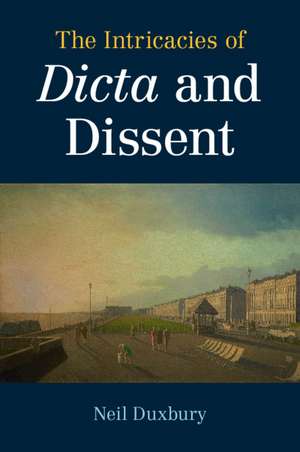The Intricacies of Dicta and Dissent
Autor Neil Duxburyen Limba Engleză Paperback – 11 aug 2021
| Toate formatele și edițiile | Preț | Express |
|---|---|---|
| Paperback (1) | 237.64 lei 22-36 zile | +14.83 lei 5-11 zile |
| Cambridge University Press – 11 aug 2021 | 237.64 lei 22-36 zile | +14.83 lei 5-11 zile |
| Hardback (1) | 698.93 lei 43-57 zile | |
| Cambridge University Press – 11 aug 2021 | 698.93 lei 43-57 zile |
Preț: 237.64 lei
Nou
Puncte Express: 356
Preț estimativ în valută:
45.48€ • 47.19$ • 38.01£
45.48€ • 47.19$ • 38.01£
Carte disponibilă
Livrare economică 24 februarie-10 martie
Livrare express 07-13 februarie pentru 24.82 lei
Preluare comenzi: 021 569.72.76
Specificații
ISBN-13: 9781108794886
ISBN-10: 1108794882
Pagini: 278
Dimensiuni: 152 x 229 x 14 mm
Greutate: 0.39 kg
Editura: Cambridge University Press
Colecția Cambridge University Press
Locul publicării:Cambridge, United Kingdom
ISBN-10: 1108794882
Pagini: 278
Dimensiuni: 152 x 229 x 14 mm
Greutate: 0.39 kg
Editura: Cambridge University Press
Colecția Cambridge University Press
Locul publicării:Cambridge, United Kingdom
Cuprins
Preface; Table of cases; Prologue; Essay I. Dicta: introduction; 1. The civilian dimension; 2. Case law as common law; 3. 'Obiter' as legal entity; 4. Dicta depicted; 5. Oblique strategies; 6. Engines of confusion; 7. The necessity test; 8. Cheap talk; 9. Dicta and dicta; 10. Nearly law?; 11. Observation and authority; 12. The sources problem; Essay II. Dissent: introduction; 13. Some preliminary observations on dissent; 14. The nature of judicial dissent; 15. Without contraries is no progression?; 16. Stalemates and motivations; 17. Dissents, decisions, and courts; 18. The tug of unanimity in England's courts; 19. Dissent in an apex court; 20. When is a dissent not a dissent?; 21. Minorities as authorities; 22. Are we agreed?; Index.
Recenzii
'Professor Duxbury provides us with a wealth of scholarship and some valuable insights into two aspects of judging which have not received much attention to date. In particular, he shows us how the two are inter-related – all dissents being essentially obiter dicta – and debunks the myth that today's dissent is tomorrow's orthodoxy – although I hope that it is not always a myth.' Brenda Hale, the Baroness Hale of Richmond, former President of the Supreme Court of the United Kingdom
'A very thoughtful discussion of two aspects of judicial practice which deserve more attention, exploring how obiter dicta are used to fit an individual case into a wider principled legal scheme and what moves judges to write dissents. It encouraged me to reflect more deeply about my own judicial writing.' Philip Sales, Justice of the Supreme Court of the United Kingdom and the Judicial Committee of the Privy Council
'In these twin essays of breathtaking range and erudition, Neil Duxbury illuminates two largely unstudied ways in which judges contribute to the common law by expressing views that create no binding precedent. Anyone interested in the craft of judging will be wiser, as well as hugely well informed, after reading this book.' George Leggatt, Justice of the Supreme Court of the United Kingdom
'Advocates and judges constitute a small minority of the legal profession. But they and others will be rewarded by reading this attractive, succinct monograph, which is an exemplary and insightful study into under-appreciated aspects of the craft of judgment writing and legal argument…. It is difficult to imagine readers who would not emerge wiser from reading the account of the changing attitudes to majority decisions of multi-member courts.' Mark Leeming, Judge of Appeal, Supreme Court of New South Wales, Cambridge Law Journal
'Anyone writing on either dicta or dissent shall firmly stand upon the shoulders of this book.' Elijah Granet, Notes on the Style of the Law
'I warmly recommend this lepidum novum libellum. Its charm is different from that of Catullus, but it is immensely readable, and readers will be richly rewarded.' Mark Leeming, Cambridge Law Journal
'A very thoughtful discussion of two aspects of judicial practice which deserve more attention, exploring how obiter dicta are used to fit an individual case into a wider principled legal scheme and what moves judges to write dissents. It encouraged me to reflect more deeply about my own judicial writing.' Philip Sales, Justice of the Supreme Court of the United Kingdom and the Judicial Committee of the Privy Council
'In these twin essays of breathtaking range and erudition, Neil Duxbury illuminates two largely unstudied ways in which judges contribute to the common law by expressing views that create no binding precedent. Anyone interested in the craft of judging will be wiser, as well as hugely well informed, after reading this book.' George Leggatt, Justice of the Supreme Court of the United Kingdom
'Advocates and judges constitute a small minority of the legal profession. But they and others will be rewarded by reading this attractive, succinct monograph, which is an exemplary and insightful study into under-appreciated aspects of the craft of judgment writing and legal argument…. It is difficult to imagine readers who would not emerge wiser from reading the account of the changing attitudes to majority decisions of multi-member courts.' Mark Leeming, Judge of Appeal, Supreme Court of New South Wales, Cambridge Law Journal
'Anyone writing on either dicta or dissent shall firmly stand upon the shoulders of this book.' Elijah Granet, Notes on the Style of the Law
'I warmly recommend this lepidum novum libellum. Its charm is different from that of Catullus, but it is immensely readable, and readers will be richly rewarded.' Mark Leeming, Cambridge Law Journal
Notă biografică
Descriere
The book examines obiter dicta and dissenting opinions as aspects of judicial decision-making.
